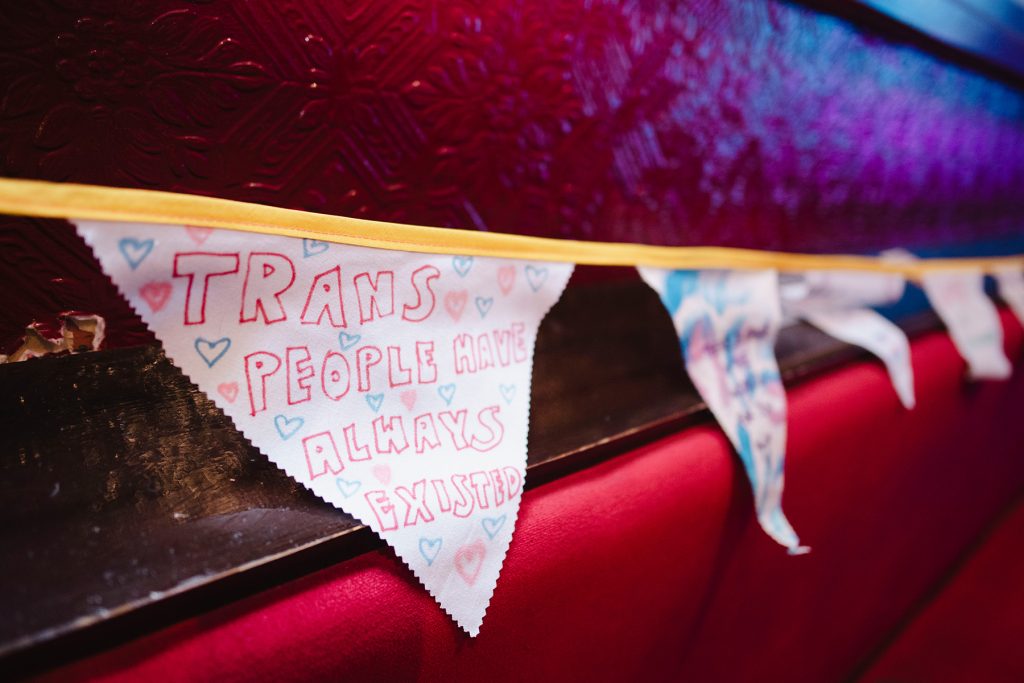Following the Supreme Court ruling in April on the definition of the term ‘woman’ in the Equality Act, the Andro and Eve team have taken time to reflect and review the range of responses that have since emerged.
As an organisation committed to celebrating queer culture, creating spaces of joy and hope for our community, and working towards a more just world for LGBTQ+people, we are appalled and extremely concerned by the lack of fairness, overt exclusion of trans voices, and, in some cases, the cruelty that has since been expressed by the media, parts of the UK Government, as well as some employers and sporting bodies across the UK.
On 16 April 2025 the Supreme Court gave its judgement in the appeal of For Women Scotland v Scottish Ministers. It ruled that for the purposes of the Equality Act 2010, the terms ‘woman’, and ‘man’ are defined exclusively based on biological sex. It explicitly excludes trans people with a Gender Recognition Certificate (GRC) from being recognised as their legal sex under the Equality Act.
The Supreme Court ruling represents another significant and alarming step in what is an increasingly aggressive, well-resourced campaign to reduce or restrict the rights and protections afforded to trans+ people in the UK. It is also part of a broader trend, both nationally and internationally, of the erosion of democratic protections, and efforts to roll back the hard-won rights, freedoms and protections afforded to the LGBTQI+ community. Together, these actions align with a growing shift towards the far right.
It also signifies a regressive step towards outdated and essentialist ideas regarding what constitutes a woman. Ideas that feminists have been fighting against for decades*, and which are now being resurrected in the interests of a small minority, as part of well coordinated attempts to restrict bodily autonomy for women including access to abortion and LGBTQ+ rights. The Supreme Court Ruling will undoubtedly have negative consequences not only for trans women but for all women, especially those who live their lives in ways that differ from gender or sexuality norms.

We know that this ruling has understandably created a lot of fear and uncertainty among members of our community and left many trans people not only feeling excluded and unsafe, but already experiencing discrimination and ostracisation during their day to day activities. The range of unknown legal and practical consequences of the ruling is of significant concern, especially regarding trans peoples’ access to essential services and gender segregated spaces.
As existing data shows, trans people, especially trans women from racially minoritised groups, are already at increased risk of violence and abuse, with the rates of hate crimes against the trans community rising dramatically over the last decade. Trans people also face continual struggles regarding healthcare access, housing, and employment. This ruling will have substantial and long-lasting consequences for the safety and well-being of trans, non-binary and gender expansive people living in the UK and the extent to which they are safe from violence and discrimination in their daily lives.
We stand firm in our commitment to stand up for the rights of trans and gender expansive people and share our solidarity, love and rage with our trans siblings. If you are trans and need support, seek help from Mermaids, Switchboard or through a local group, friends or loved ones if you are able.
This is a crucial moment to stand up for the rights of trans people in the UK, and take action to ensure every person, regardless of gender identity or sexuality is respected, protected and can live safely and free from harm.
Take Action
The Equality and Human Rights Commission (EHRC) is updating the statutory Code of Practice for Services, Public Functions and Associations affected by the Supreme Court ruling and are seeking feedback from members of the public through a public consultation.
We urge you to contribute to this public consultation, holding at the forefront of your mind the rights of trans people, and the care and compassion each and every trans person deserves. There is guidance available on how to complete it provided by Scottish Trans, Mermaids and TransActual. Participate by completing the online survey. There is not much time to respond – the consultation closes on Monday 30 June 2025.
If you would like further information about the ruling, and how your workplace can remain trans inclusive, we are also hosting a free webinar on 18 June at 12pm.
You can also write to your local MP to share your concerns regarding this ruling. Scottish Trans have created a useful tool which enables you to write a letter in minutes – you can adapt the text and follow this link if you are a trans or non-binary person, or this link if you are an ally to our community. For further actions associated with the EHRC consultation and in support of trans rights, the LGBT+ Consortium have created this EHRC Consultation webpage to collate useful resources, including links to planned protests.
As we await further guidance regarding what the legal, political and social implications of this ruling will be for trans people, it is important to remember that the lives of trans people and their right to exist and be protected under the law should NEVER be up for debate.
Now is the time for allies to visibly support their trans+ peers and demand they are protected.
If you are looking for further information on the situation for trans and non-binary people in the UK and how to support trans inclusive practices, we offer Gender Awareness Training for organisations. For more in depth support and advice around trans equity and inclusion in the workplace, or to talk through a specific situation, please reach out about our consultancy services.
* As the Combahee River Collective stated in their statement of 1977 – ‘As Black women we find any type of biological determinism a particularly dangerous and reactionary basis upon which to build a politic’.

